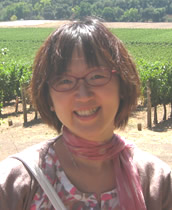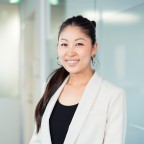Professor Makiko Deguchi is an associate professor in the Department of English Studies. She completed her undergraduate work in Economics at Wellesley College and then went on to earn two Masters in Psychology and Human Development, as well as her Ph.D. in Cultural Psychology, at Boston University. She recently translated the book Diane J. Goodman’s “Promoting Diversity and Social Justice: Educating Members of Privileged Groups” 2011, into Japanese. Professor Deguchi sat down with editors of the student journal Angles, to discuss the book, her career, and her teaching philosophy.
Angles Editors: Why did you choose (to study/teach) psychology?
Professor Deguchi: Well, my undergraduate major was in economics and I had regretted majoring in a subject that I wasn’t passionate about. I chose economics because it sounded serious. I was in this stoic stage where I thought learning should hard and difficult, not fun. Perhaps I was scared to go after what I truly wanted. There was a popular career path of graduating from Wellesley with an economics degree, then working for an investment bank for a few years, go back for an M.B.A. in business school, and marry a finance man. I thought this was the path I should follow. The problem was, I had no interest in money whatsoever. My favorite courses were “social construction of gender,” “Japanese civilization,” and courses in sociology, anthropology, and women’s studies. I realized after four years, that it was a  mistake to major in economics.
mistake to major in economics.
After graduating from college and living in Tokyo, I found myself getting involved in study groups and reading groups about women’s studies. Learning about feminism was fun, and I realized that I enjoyed spending my free time going to symposiums, lectures, and events about women’s studies and psychology. Feminist therapy was in at the time, and I applied to a graduate program in psychology thinking, I’ve been given a second chance at this—I’m not going to screw this up.
Angles Editors: Was studying psychology challenging?
Professor Deguchi: Going back to school in my late twenties allowed me to have a different perspective, so everything was new and exciting. Basically, I was thriving, I knew what a luxury it was to go back to being a full-time student. I ended up doing graduate school for eleven years, though.
Angles Editors: Why did it take so long?
Prof. Deguchi: I ended up earning two Master’s degrees in the first three years, and the Ph.D. took eight years. I think I took my time with my Ph.D. because I actually didn’t take my academic career all that seriously. I grew up in a very conservative household where my father was the breadwinner, my mother was a homemaker with a clear division of labor along gender lines. Even though I was a feminist, I think the internalized misogyny ran deep and I didn’t take my career seriously for a long time. Finally, the university told me that if doctoral students don’t finish after eight years, they’d kick us out. That was the wake-up call. But the thought that I actually had to earn a living with my Ph.D. was absolutely terrifying. It’s really through just years and years of working as an academic that gradually made me capable of taking myself seriously.
Angles Editors: Tell us about the book you translated. (Diane J. Goodman’s “Promoting Diversity and Social Justice: Educating Members of Privileged Groups” 2011, 2nd Edition)
Prof. Deguchi: Well, it all started when I was teaching cultural psychology at Wellesley College. The students were very receptive to the course content, but one day, they told me that learning about cultural differences between Asians and Westerners was great and all, but they really wanted to learn how to have a dialogue around the issue of race and racism. Up until that point, I was probably actively trying NOT to talk about race or racism because it brought back painful memories, and part of me felt helpless that nothing was going to change anyway.
But I did take the students’ request to heart. So little by little I started studying about racism, and I realized that if I’m going to teach about racism, I would have to start by really persuading the skeptical side of myself. The conclusion I reached was that I’d have to start with white privilege. Racism in the U.S. is a white person’s problem, and it is a problem when issues of oppression are seen as the problem of the disenfranchised, not that of the oppressor. I started doing workshops and introducing segments in class. I received positive feedback which gave me confidence and kept me going. That lead me to attend Diane Goodman’s workshop—she’s an experienced diversity trainer who conducted numerous workshops aimed at educating members of privileged groups. The privileged groups can include Whites, males, heterosexuals, or middle to upper-classes. I read her book and asked her if I could translate it into Japanese for Japanese readers. It is now a textbook I use in my Psychology of Positionality course. Diane was worried whether the content would be relevant in Japan, but I assured her that every time I gave a talk about white privilege, Japanese activists and members of minority groups were extremely receptive.
Angles Editors: How did you end up in the Department of English Studies?
Prof. Deguchi: I was teaching at Kobe Women’s College, but that was a terminal position. Then I saw an ad for someone with a PhD in a social science field, a native-level English speaker who could teach native-level English students, and I thought “I can check off all the qualifications!” I personally feel the position was an extremely good fit and have been very happy here.
Angles Editors: Have you always enjoyed teaching?
Prof. Deguchi: I have. I always liked helping people learn even as a young child. I have a younger brother, and I would often play “school” and be the teacher and make my brother my student. When I learned something new in school, I immediately wanted to go home and teach my brother. I always had a dream to be a teacher but my confidence dropped during high school and college and so I sort of distanced myself from that dream. But once I started teaching my own classes during graduate school, although I was terrified at first, I came to embrace my initial passion.
Angles Editors: What do you want students to take away from your classes?
Prof. Deguchi: I want Sophia students to feel a sense of responsibility to the larger world. Sophia students already are blessed with so much privilege, including that of a good education. When students graduate and tell people they’re from Sophia University, they command a certain respect. You’re going to have the power to make a difference in the world, so use that privilege wisely. “Men and Women with Others, For Others,” is something that grounds me. So use that privilege and influence to lift other people up.
Professor Deguchi is also the assistant director of the Center for Global Discovery and the Director of Short-Term Programs at Sophia University. She teaches classes in Cultural Psychology, Privilege, and the Psychology of Positionality. To learn more about her ideas, please take her courses or read the book she translated.
To read the first part of our interview with Professor Deguchi, please click here.


















